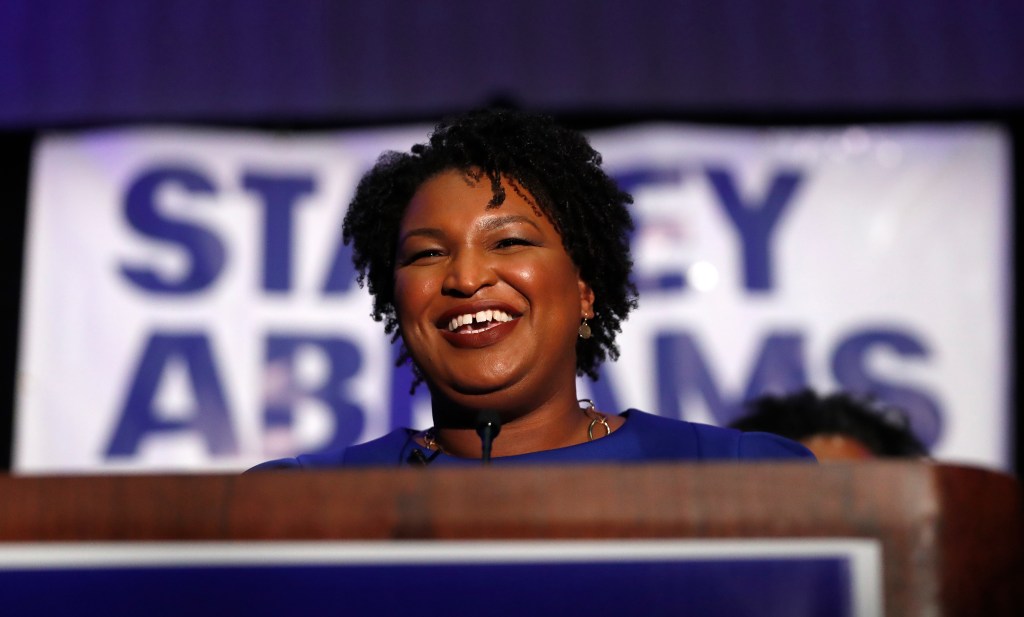Judge rules against Abrams’ group; Notes state’s practices burdensome to voters
Published 11:00 am Tuesday, October 11, 2022

- Democratic candidate for Georgia Governor Stacey Abrams speaks during an election-night watch party Tuesday, May 22, 2018, in Atlanta.
ATLANTA — A federal judge has ruled against voting rights group Fair Fight Action’s claims of Georgia voter suppression in 2018 elections, although the judge noted several state practices that are burdensome to voters.
Judge Steve C. Jones of the United States District Court Northern District of Georgia ruled in favor of Secretary of State Brad Raffensperger Sept. 30, stating “although Georgia’s election system is not perfect, the challenged practices violate neither the constitution nor the Voting Rights Act.”
Jones noted there are several policies that burden Georgia voters, such as the felon matching process. During the trial, several voters testified that the Georgia Secretary of State’s office erroneously had them label as felons, making them not eligible to vote.
”Plaintiffs provided evidence that voters who are misidentified as felons face additional burdens when exercising their right to vote that exceed a simple inconvenience,” Jones stated in the ruling. “The felon matching process forces individual voters erroneously caught by the Secretary’s matching criteria to navigate administrative obstacles that are distinctly more burdensome than the obstacles. A voter erroneously listed as a felon will have to remedy that mistake to remain on the voter rolls…”
Jones also called attention to the SOS’s choice to use race as a criterion for matching voter records to the list of persons convicted of a felony, though the SOS does not rely on race to match records in any other list maintenance process.
He noted that the state deprived Georgians of the right to vote “by administering an election plagued with irregularities that disproportionally affected voters of color.”
Fair Fight Action had alleged in the lawsuit that the Exact Match signature policy and its application racially discriminate against Georgians of color in violation of the Fifteenth Amendment.
An expert witness at trial said voters of color are overwhelmingly in MIDR (Missing Identification Required) status or end with citizenship verification flags. The evidence at trial also showed that in 2018, the SOS Office undertook an internal review of the voter files and concluded that approximately 70% of applicants in pending status for failed verification at the Department of Driver Services or SSA were Black.
However, the witness testified that there was substantial variation in the MIDR match numbers among counties that could not be explained by race, and he suggested “different administrative practices in different counties, even with the same overall demographics.” He also testified that for Citizenship Match, the numbers “are suggestive of and consistent with inconsistent administrative practices around and in different jurisdictions around the state.”
The lawsuit was filed by the group founded by Stacey Abrams in November 2018, following her loss to Brian Kemp in the state’s gubernatorial election.
While the lawsuit wasn’t the outcome Fair Fight had hoped for and did not result in mandatory fixes to the state’s election policies, the group highlighted what it considered wins that were acknowledged by Jones in his order. The order detailed the impact the challenged practices on Georgia voters:
60,477 voters were flagged as “MIDR” as of January 2020; 70% of voters in MIDR status are Black 3,037 hopeful registrants were placed in pending status because of a citizenship flag — a status that carries a greater than 60% error rate 1 out of every 100 Black naturalized citizens living in Georgia were placed in pending status because of a citizenship flag 54,730 voters were removed from the rolls in 2020 based on the felon match process 25,000 voters were flagged for removal from the rolls in a single night based on loose criteria for felon matching — criteria the Court recommended the State eliminate and criteria which the Court explicitly noted are unique in its inclusion of race to identify records that match with the list of persons convicted of a felony 22,000 voters were saved from the 2019 voter purge after plaintiffs filed for a preliminary injunction
“The court’s order explicitly lays out the hazards of a system rife with barriers that disproportionately impacted Black and brown people. Imperfection is no excuse for the discriminatory practices Georgians saw from the Secretary of State’s office in the 2018 elections,” Abrams stated after the ruling. “The work continues to defend voters against the newest iteration of voter suppression created by SB 202, and I am determined to fight against the ‘generalized indicators of the status of minority life in Georgia’ that a robust democracy is designed to improve.”
SB 202 is Georgia’s new Republican-led voting law approved in 2021 after former Pres. Donald Trump’s 2020 loss for reelection. Trump and supporters alleged unfounded voter fraud took place.
Raffensperger acknowledged the challenge in balancing voter access with election integrity while strictly abiding by voting laws and the Constitution. With the end of the four-year lawsuit, Raffensperger said local election officials can now fully focus on running a safe, secure and accessible election.
“This decision should quiet all those who sow fear and public distrust by denying the results of Georgia’s elections, so that Georgians know they can cast a vote, and that it will be counted in elections that are free and fair,” he stated.
CNHI reached out to Raffensperger’s office to see if he would look into revising some of the “burdensome” practices listed in the judge’s order and has not yet heard back.



